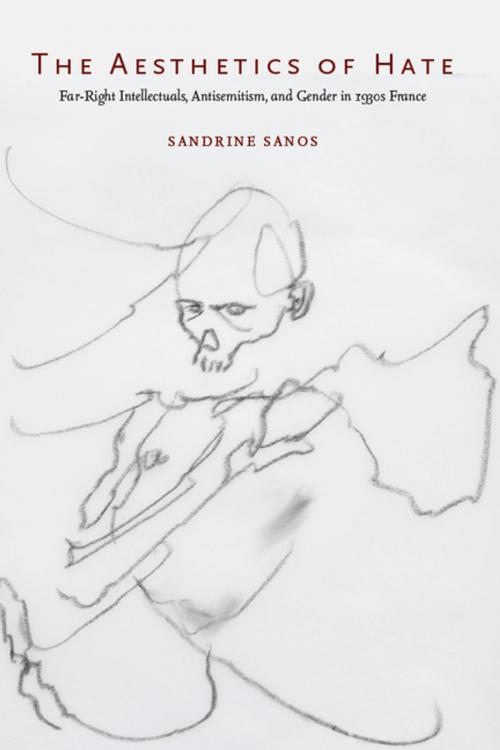The Aesthetics of Hate
Far-Right Intellectuals, Antisemitism, and Gender in 1930s France
Nonfiction, History, France| Author: | Sandrine Sanos | ISBN: | 9780804782838 |
| Publisher: | Stanford University Press | Publication: | October 24, 2012 |
| Imprint: | Stanford University Press | Language: | English |
| Author: | Sandrine Sanos |
| ISBN: | 9780804782838 |
| Publisher: | Stanford University Press |
| Publication: | October 24, 2012 |
| Imprint: | Stanford University Press |
| Language: | English |
The Aesthetics of Hate examines the writings of a motley collection of interwar far-right intellectuals, showing that they defined Frenchness in racial, gendered, and sexual terms. A broad, ambitious cultural and intellectual history, the book offers a provocative reinterpretation of a topic that has long been the subject of controversy.
In works infused with rhetorics of abjection, disgust, and dissolution, such writers as Maulnier, Brasillach, Céline, and Blanchot imagined the nation through figures deemed illegitimate or inferior—Jews, colonial subjects, homosexuals, women. Sanos argues that these intellectuals offered an "aesthetics of hate," reinventing a language of far-right nationalism by appealing to the realm of beauty and the sublime for political solutions.
By acknowledging the constitutive relationship of antisemitism and colonial racism at the heart of these canonical writers' nationalism, this book makes us rethink how aesthetics and politics function, how race is imagined and defined, how gender structured far-right thought, and how we conceive of French intellectualism and fascism.
The Aesthetics of Hate examines the writings of a motley collection of interwar far-right intellectuals, showing that they defined Frenchness in racial, gendered, and sexual terms. A broad, ambitious cultural and intellectual history, the book offers a provocative reinterpretation of a topic that has long been the subject of controversy.
In works infused with rhetorics of abjection, disgust, and dissolution, such writers as Maulnier, Brasillach, Céline, and Blanchot imagined the nation through figures deemed illegitimate or inferior—Jews, colonial subjects, homosexuals, women. Sanos argues that these intellectuals offered an "aesthetics of hate," reinventing a language of far-right nationalism by appealing to the realm of beauty and the sublime for political solutions.
By acknowledging the constitutive relationship of antisemitism and colonial racism at the heart of these canonical writers' nationalism, this book makes us rethink how aesthetics and politics function, how race is imagined and defined, how gender structured far-right thought, and how we conceive of French intellectualism and fascism.















